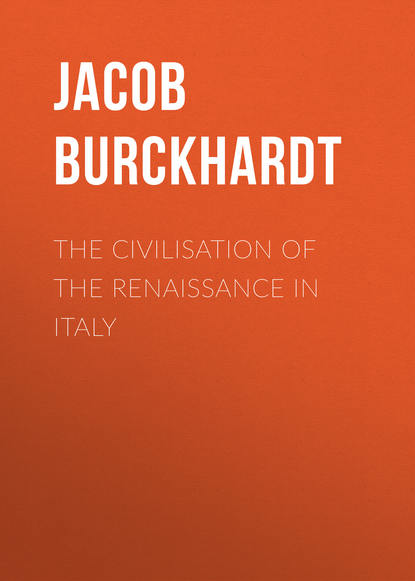По всем вопросам обращайтесь на: info@litportal.ru
(©) 2003-2024.
✖
The Civilisation of the Renaissance in Italy
Настройки чтения
Размер шрифта
Высота строк
Поля
1250
The local belief on the matter is given in Annal. Forolivens. Murat. xxii. col. 207, 238; more fully in Fil. Villani, Vite, p 33.
1251
Platina, Vitae Pontiff. p. 320: ‘Veteres potius hac in re quam Petrum, Anacletum, et Linum imitatus.’
1252
Which it is easy to recognise e.g. in Sugerius, De Consecratione Ecclesiae (Duchesne, Scriptores, iv. 355) and in Chron. Petershusanum, i. 13 and 16.
1253
Comp. the Calandra of Bibiena.
1254
Bandello, iii. nov. 52. Fr. Filelfo (Epist. Venet. lib. 34, fol. 240 sqq.) attacks nercromancy fiercely. He is tolerably free from superstition (Sat. iv. 4) but believes in the ‘mali effectus,’ of a comet (Epist. fol. 246 b).
1255
Bandello, iii. 29. The magician exacts a promise of secrecy strengthened by solemn oaths, in this case by an oath at the high altar of S. Petronio at Bologna, at a time when no one else was in the church. There is a good deal of magic in the Maccaroneide, Phant. xviii.
1256
Benv. Cellini, i. cap. 64.
1257
Vasari, viii. 143, Vita di Andrea da Fiesole. It was Silvio Cosini, who also ‘went after magical formulæ and other follies.’
1258
Uberti, Dittamondo, iii. cap. 1. In the March of Ancona he visits Scariotto, the supposed birthplace of Judas, and observes: ‘I must not here pass over Mount Pilatus, with its lake, where throughout the summer the guards are changed regularly. For he who understands magic comes up hither to have his books consecrated, whereupon, as the people of the place say, a great storm arises.’ (The consecration of books, as has been remarked, p. 527, is a special ceremony, distinct from the rest.) In the sixteenth century the ascent of Pilatus near Luzern was forbidden ‘by lib und guot,’ as Diebold Schilling records. It was believed that a ghost lay in the lake on the mountain, which was the spirit of Pilate. When people ascended the mountain or threw anything into the lake, fearful storms sprang up.
1259
De Obsedione Tiphernatium, 1474 (Rer. Ital. Scrippt. ex Florent. codicibus, tom. ii.).
1260
This superstition, which was widely spread among the soldiery (about 1520), is ridiculed by Limerno Pitocco, in the Orlandino, v. 60.
1261
Paul. Jov. Elog. Lit. p. 106, sub voce ‘Cocles.’
1262
It is the enthusiastic collector of portraits who is here speaking.
1263
From the stars, since Gauricus did not know physiognomy. For his own fate he had to refer to the prophecies of Cocle, since his father had omitted to draw his horoscope.
1264
Paul. Jov. l. c. p. 100 sqq. s. v. Tibertus.
1265
The most essential facts as to these side-branches of divination, are given by Corn. Agrippa, De Occulta Philosophia, cap. 57.
1266
Libri, Hist. des Sciences Mathém. ii. 122.
1267
‘Novi nihil narro, mos est publicus’ (Remed. Utr. Fort. p. 93), one of the lively passages of this book, written ‘ab irato.’
1268
Chief passage in Trithem. Ann. Hirsaug. ii. 286 sqq.
1269
‘Neque enim desunt,’ Paul. Jov. Elog. Lit. p. 150, s. v. ‘Pomp, Gauricus;’ comp. ibid. p. 130, s. v. Aurel. Augurellus, Maccaroneide. Phant. xii.
1270
In writing a history of Italian unbelief it would be necessary to refer to the so-called Averrhoism, which was prevalent in Italy and especially in Venice, about the middle of the fourteenth century. It was opposed by Boccaccio and Petrarch in various letters, and by the latter in his work: De Sui Ipsius et Aliorum Ignorantia. Although Petrarch’s opposition may have been increased by misunderstanding and exaggeration, he was nevertheless fully convinced that the Averrhoists ridiculed and rejected the Christian religion.
1271
Ariosto, Sonetto, 34: ‘Non credere sopra il tetto.’ The poet uses the words of an official who had decided against him in a matter of property.
1272
We may here again refer to Gemisthos Plethon, whose disregard of Christianity had an important influence on the Italians, and particularly on the Florentines of that period.
1273
Narrazione del Caso del Boscoli, Arch. Stor. i. 273 sqq. The standing phrase was ‘non aver fede;’ comp. Vasari, vii. 122, Vita di Piero di Cosimo.
1274
Jovian. Pontan. Charon, Opp. ii. 1128-1195.





